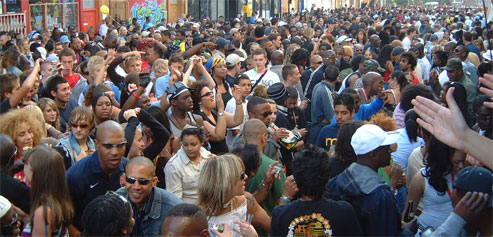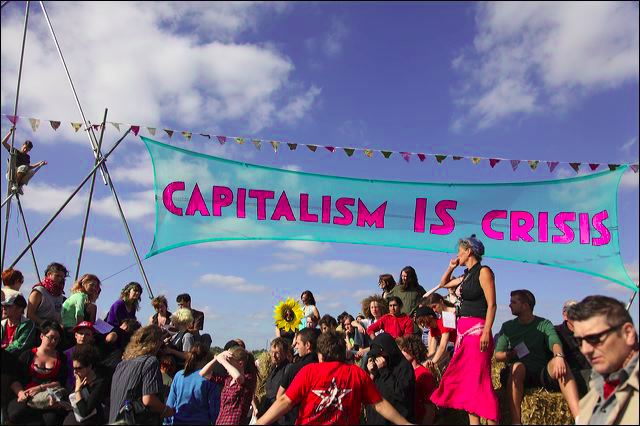Middle Class Concentration Climate Camp: Some thoughts
Max Holz | 01.09.2009 12:39 | Climate Chaos | Social Struggles | Workers' Movements | World

Carnival 2009

Climate Camp 2009
As for making the camp vegan, that's pure activist scenesterism. It's fine to try to show people alternatives (as the camp tries to do) but how will most people react to this rule? Most non-activists people I spoke to about this couldn't believe it. Anti-capitalism is the realm of anyone interested in honest and genuine discussion to make amazing things happen and to change the world but it cannot begin with rules that act as answers before anyone has even asked some questions.
As for the class composition of the camp there's no point in trying to portray it as a diverse crowd. It's simply not. Apart from a few working class people who have been in the activist scene for ages (and who are mainly wary of media attention unlike the more middle class ones who trust the media to get their message out), it's rare that working class people get involved in this kind of activism and I doubt that the middle class concerns and behaviour at Climate Camp will be bringing them in.
It's not that working people are the true salt-of-the-earth politically vibrant class. Of course not but they are the ones who will ultimately make the difference between a mistrusted self-conscious role-playing activism and a genuine anti-capitalist movement that puts a blockage on the functioning of the economy, occupies, expropriates and begins to run the new society. This will never be the product of middle-class activism with it's fetish for veganism, politeness and non-coercion and sometimes a pointless pacifism that denies a revolutionary violence (all the time whilst supporting violent revolutionary struggles abroad - Oaxaca, West Papua, Nigeria for example)
Questions about wage slavery, labour, the family, private property, class struggle and solidarity have not gone away even if the last vital period of upheaval and real anti-capitalist resistance was the 1970's and early 80's. It's these questions that need to sit aside climate change politics so that some kind of movement that has an everyday relevance to non-activist (i.e most people) can bring itself into being. There seems to be the notion around some Camp attendees that 'class analysis is so 20th Century' as if this allows middle-class people off the hook when having to face up to their own economic position in this society. Well, most people in the world aren't well-off. They don't have the luxury of giving up struggling to get by if they fancy it and want to use their self-confident bourgeois manner to now get a good job. Their concerns are daily bread ones and not an often abstract climate change politics.
Who would want to be a self-defined revolutionary these days when this position seems to mark you out as deluded Citizen Smith-type cliche? Worse, from your own side, are some Climate Camp people's definition of 'hater' for those who hatred of capitalism is pasionate. This hatred also finds an enemy in those who want to appease capitalism for whatever perverse reasoning. Hence, we live in the most reactionary of times where genuine radical ideas are not the common questions of the day. You can see this played out at Climate Camp when radicals talk of the deathwish of relying on reforming The State or big business to implement any measures that will tackle climate change.
So many people at Climate Camp still believe that 'we are The State' and it can work for us. If this is the case then why is Climate Camp non-hierarchical and committed to some kind of direct action? If this is the case then why are we in the mess we are in today? It's not because the will of the people wanted to have to work all day in an alienating mass of social relations boosting the wealth of a small population of rich people AND also watch the climate go ballistic as a result and wipe us all out.
But revolutionary ideas are the only ones that will connect with those who can make a difference. At the Camp I've heard many people talk about 'bottom-up' organising and then go on to wonder they those at the bottom can really be trusted to make the right decisions. This classist position assumes that a feelgood middle class jamboree of moral worthness, alleged self-sustainability and polite discussion with it's hand-signal nicities is the active movement of change itself without needing to actually involve the ones who maybe don't 'get it' or who are right now either mistrustful and put off Climate camp or just plain antagonistic to it. The middle classes have never made a revolution that wasn't made in it's own narrow self-interest. As someone said at the Camp - meet the new Green boss, same as then old one.
This isn't either about educating the masses as some of the Climate Camp attendees seem to think. That kind of patronising zeal will hardly go down well with anyone Climate Camp comes across to 'enlighten'. This is the kind of message the media-friendly camp comes across as. Live by the media, die by the media - that's a wise a message as any which has not been learned by Jordan, Posh Spice or Climate Camp.
It's the ensemble of social relations that make a movement dynamic and going somewhere. When I was at Carnival I felt this dynamic at work. There are many, many problems at Carnival (from police repression to individuals acting act, fronting and playing the most parasitic of neo-liberal roles against others). But Carnival is still an expression of life and will of togetherness that for a moment transcends the mediocre existence we are supposed to impose upon ourselves day after day. The way to be and behave at Carnival is made and enacted by all and these come from common sense and not a list posted at the entrance point. I have more hope for the future from being around a million people in Notting Hill than I do being around 2000 people on Blackheath who seemingly want to make a future world based on moralistic austerity and limits on freedoms that's premised on a hybrid of green and reformed capitalism.
My revolution wants to free up the world by taking back the land, resources, technology and providing for all instead of just a few like now. This is not a revolution for all to then consume the world to death but a revolution that is based on common-sense abundance and not austerity.
Max Holz
Comments
Display the following 30 comments